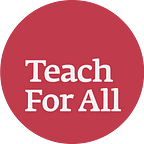Changing the Narrative by Helping Raise Refugee Children’s Voices
Today, we join organizations and governments around the world in recognizing World Refugee Day, an opportunity to raise awareness of the growing global plight of those who have fled or been forced to leave their homes and countries due to lack of security and political or economic instability. According to the United Nations High Commissioner for Refugees, a record 65.6 million people are currently displaced across the globe — 300,000 more than in 2015. Of the 22.5 million refugees, half of these are children, many of whom lack access to education, or attend schools in countries where they are unfamiliar with the local language and culture. The participants and alumni of Teach For All network partners in several countries are actively working to support students who are refugees, as well as their families and communities.
Since 2015, over one million refugees have entered Germany, more than any other European country. This influx has meant that more than half of Teach First Deutschland Fellows are working to integrate young refugees into their classrooms, teaching them language skills and supporting them both academically and socially. In North Rhine-Westphalia, three Fellows have joined forces to develop a project designed to give a voice to their foreign-born students, 80% of whom are refugees.
A year ago, a workshop Teach First Deutschland Fellows attended to enhance their own project management skills sparked an idea for Fellow Marius Runkel: Why not use creative writing as a tool to help newly immigrated children share their stories? Because the refugee crisis is a prominent and highly polarizing issue in Germany, helping these students recognize the power to express themselves felt imperative. Together, he and Fellows Juliane Seumel and Johanna Esch collaborated with their students (ages 11–17) to produce a book chronicling their often treacherous journeys from their home countries to Germany, and their reflections on life before and since.
“Germany is one of the richest developed countries, on a global scale. If we are not willing to accept people, then how do we expect other countries to do so?” asks Juliane. “We want to give [our students] the chance to tell their stories because often times, they don’t have the means to communicate their individual experiences. We want to start changing mindsets.”
In creating the book with their students the Fellows were struck by their resilience, and the courage it took them to speak and write about their intimate experiences. The project has sparked interesting conversations about the children’s dreams and aspirations for the future, and what they expect from their new home country, as well as helping them gain confidence in themselves and furthering their German language skills.
“They are so resourceful, and they rose to the occasion despite everything,” shared Juliane.
The book will be released on June 30 and will be sold across Germany and on the publisher’s website. The Fellows and their students hope it will inspire other schools, teachers, and students to replicate the exercise or develop similar creative activities to give students a voice in the conversation around migration.
Join the World Refugee Day conversation on social media using #TeachForAll, #WithRefugees and #RefugeeDay
A sampling of some of the students’ own illustrations for the book (clockwise from left: Zala, Farah Bano, Negin)
You can also read this story on our website: http://teachforall.org/en/news/changing-narrative-helping-raise-refugee-childrens-voices
